Which is Best for Brewing Tea? Tap vs Mineral vs Purified
If you ask anyone what they drink to quench their thirst, it’s water first, and then comes the tea. But if you ask real tea enthusiasts, they will tell you the secret to a fragrant cup of tea. It’s not just tea leaves. It’s the water! You may buy the most expensive and highest quality of tea leaves, but without pure, clear water, the cup of tea you brew tastes like any other generic, low-quality tea. Impurities in water affect the tea’s taste, color, clarity, and aroma, and it’s noticeable, especially to an avid tea drinker. When the water is 99% of the cup of tea we drink, why shouldn’t we care about what water we use to brew it? In ancient China, people searched for the best water to brew tea. That’s what we should do as well. We should choose among tap water, mineral water, and purified water.
In this article, we will explore the differences between these types of water and see which one is the best for brewing an authentic cup of black or herbal tea.
Why is The Water We Brew Tea With So Important?
When we brew tea, it’s not just the tea that gives it flavor. Water also plays a major role in the taste, color, clarity, and aroma. If the water smells like chlorine or has other impurities, especially tap water, the odor and taste will be mixed with the tea leaves when brewing. Sometimes, the reason tea becomes cloudy or too bitter is due to these impurities.
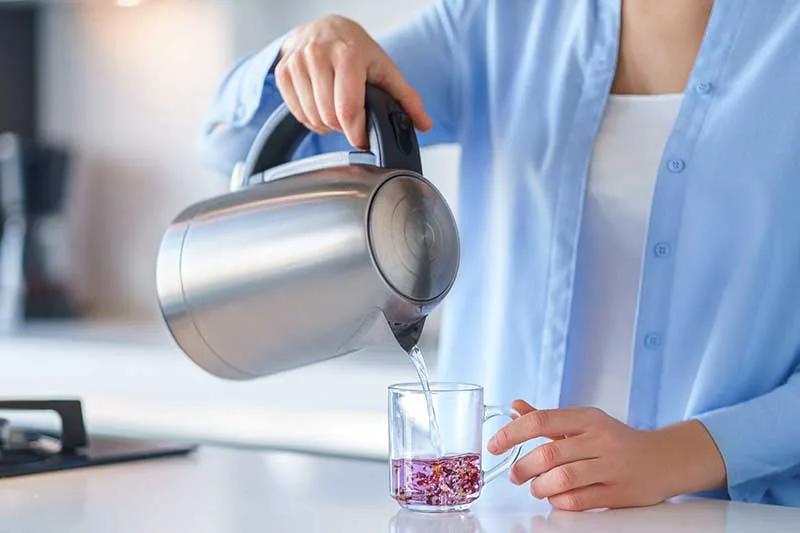
On the other hand, if the water is 100% pure without any minerals, like distilled water, the tea will taste flat and bland. Something, that should be in the water to work the magic and give us the taste and aroma we’re looking for in our cup of tea, is missing.
Generally, we can say the best water for brewing tea should be:
- Clean and clear
- Free of odors and flavors
- Contain a small amount of minerals
Without these properties, the tea we brew isn’t the tea we’re looking for!
We commonly have three sources of water to brew tea with:
- Tap water
- Purified water
- Mineral water
Let’s see what are the characteristics of each and what effect they have on the tea we brew.
Tap water
In most households, the go-to choice for brewing tea is tap water. I used to brew my herbal tea with tap water too. The reason is simple and obvious. It’s always there and convenient. In developed countries, tap water is potable (safe to drink) and is constantly monitored for impurities.
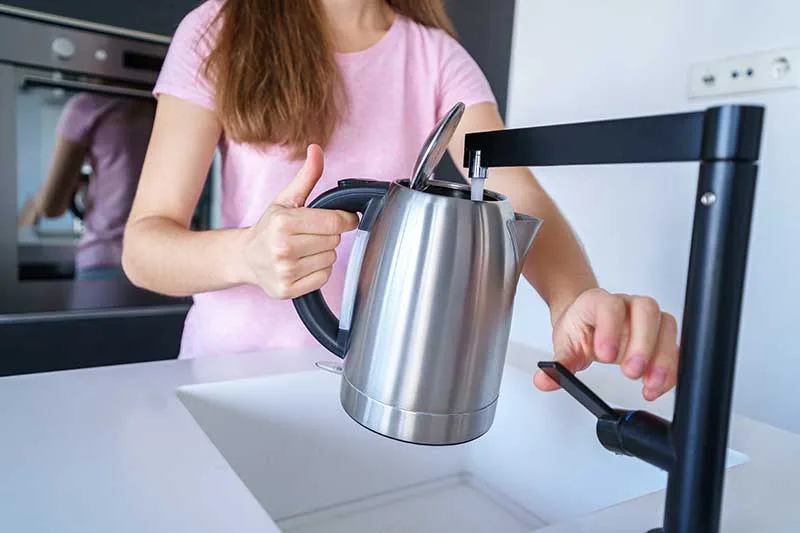
However, in some regions, tap water has a specific, often unpleasant or weird, taste and smell. The odor comes from chlorine or industrial purification agents. While chlorine is effective to kill all bacteria, it can’t remove certain minerals and impurities. If you boil tap water, take a look at inside your kettle. The white layer deposited in the kettle is the excess minerals, which means the water is hard.
Mineral deposits affect the taste of the tea. It will taste
This deposit also affects the taste of tea. It has a certain metallic, bitter taste. You can filter the tap water with a filter pitcher or a milk filter to improve the quality of the water. They may reduce the odor and taste, but it is still there when you brew a cup of tea with it.
Purified Water
Today, many households have water purifiers. The simplest type is a filter pitcher, which most people know as a Brita pitcher. It removes most of the strange odors and tastes from the tap water. Basic purifiers filter water to a decent quality for brewing a cup of tea.
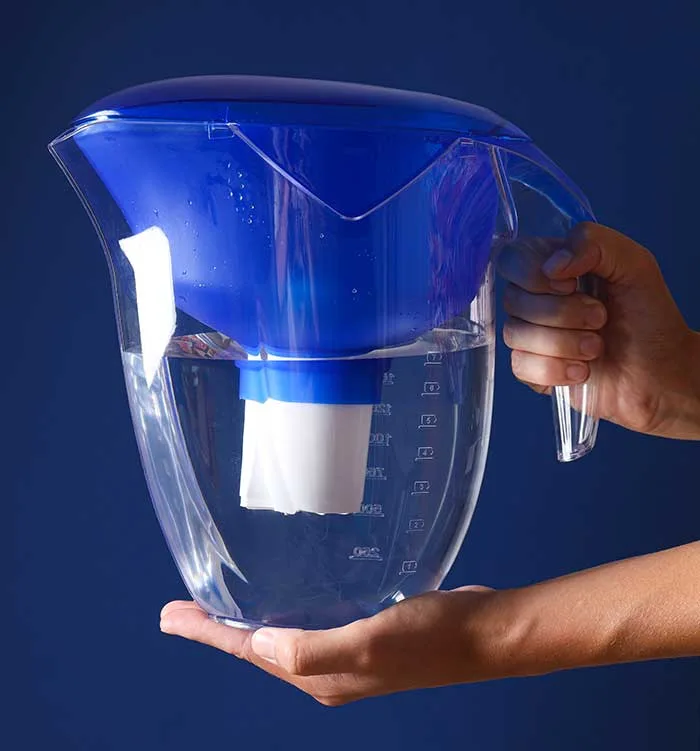
Advanced water purifiers use reverse osmosis (RO) technology to purify water. RO is effective in removing excess salts, heavy metals, and unpleasant impurities from the water. Therefore, the tea acquires a clearer color and a more authentic, natural flavor.
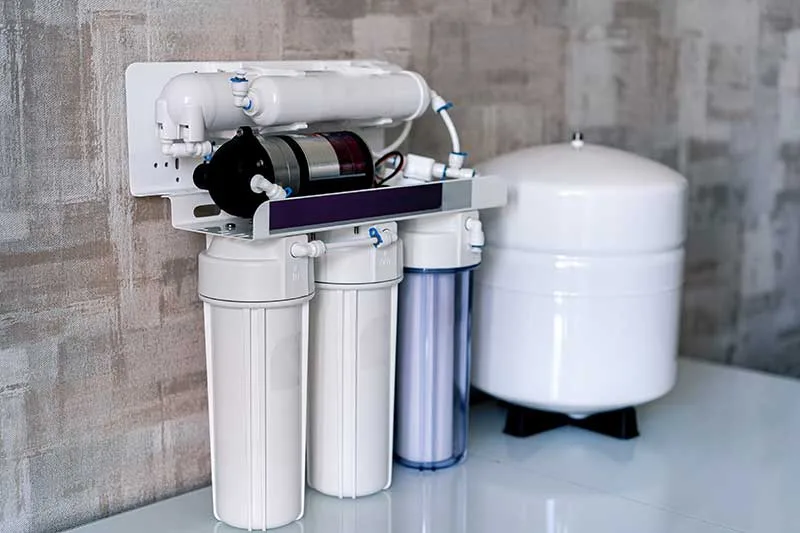
But as I said earlier, over purified water without minerals makes the tea tasteless. Most reverse osmosis purifiers have a mineral stage in their process to add essential minerals back to the water. However, some tea drinkers solve this problem by throwing a piece of bamboo charcoal into the water or mixing the purified water with a store-bought mineral water to balance the taste of the tea.
Mineral Water
Some tea drinkers consider mineral water the best choice for brewing tea. This is because of the consistency in the quality, clarity, and purity of the water. If you choose a good brand of mineral water, you will find that it has a neutral taste and contains beneficial minerals. Therefore, when you brew tea with mineral water, the color of the tea becomes clearer and the taste is milder.
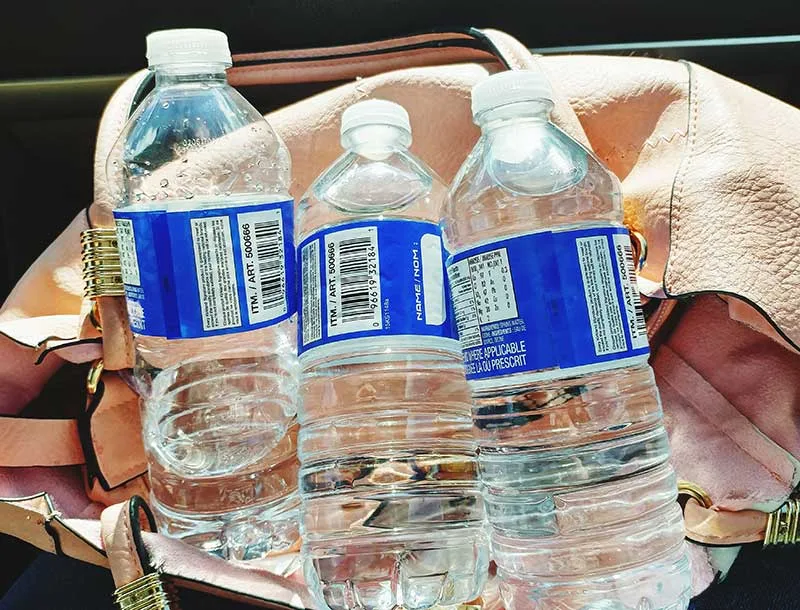
But mineral water comes with a few problems:
- Cost: It’s often expensive to use mineral water to brew tea, especially if you drink tea several times a day.
- Environment: Mineral water often comes in plastic bottles that end up in landfills or oceans, creating a lot of waste.
- Improper Storage: If the mineral water in bottles is stored improperly, like outside under the sun, compounds in the plastic bottle will affect the water’s taste in a horrible, often dangerous way.
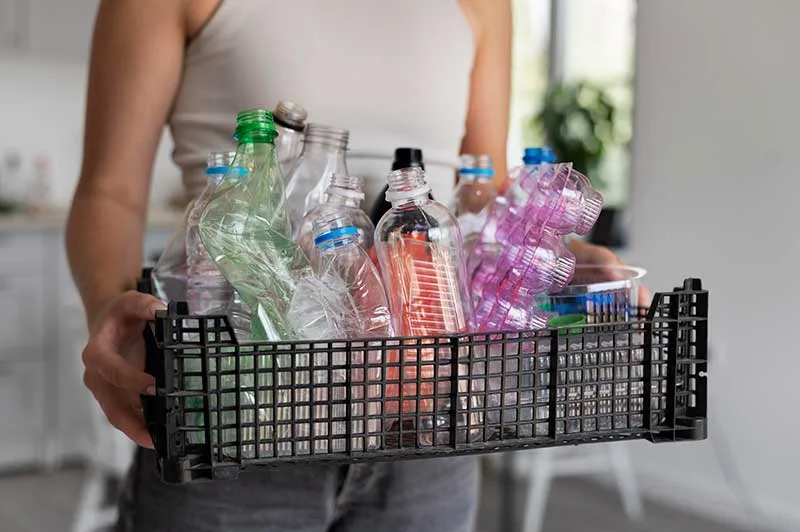
For these reasons, responsible, avid tea drinkers often use mineral water on special occasions, such as parties, afternoon tea gatherings, or during trips.
What is Hard and Soft Water?
You may have heard the terms hard water and soft water. What do they mean exactly?
Hard water is tap water with a lot of salts, such as calcium and magnesium. If you live in an area where the water leaves a lot of scale in your kettle, you have hard tap water. Soft water, on the other hand, has very few minerals. Most household purifiers make the water soft.
Now, how do they affect the taste of tea? When you brew tea with hard water, the taste is slightly stronger, but soft water will make the tea milder. Soft water is usually better for light teas, such as green tea. However, black tea with slightly hard water will have a better taste and more pronounced aroma.
How to Find the Best Water?
There isn’t a rule of thumb to choose the best water to brew a cup of tea with. It depends on your taste. Some love strong, rich tea, so tap water with a little salt is the best option for them. Others prefer a milder taste and choose purified water instead.
In my opinion, the best thing to do is to try it once. Brew your tea once with tap water, once with filtered water, and once with mineral water. Then compare the color, clarity, aroma, and taste. See which one you like the most and then go with it long term. If you can feel the difference, then it’s the right choice for you.
If tap water tastes good but has sediment, install a basic water filter. If it has a specific smell, a reverse osmosis water purifier can help. If you are very sensitive to the taste of your tea, you can try a combination of purified water and a little mineral water.
Conclusion
Ultimately, good tea is not just about the tea leaves and the temperature of the water, the right water is the key to a great cup of tea. If your tea tastes metallic, sharp, or bland, it may be time to pay attention to your brewing water. Many tea experts say the best water is one that is balanced in terms of minerals and has a neutral taste. Tap water is fine for most people, as long as it is of good quality or has been improved with a filter. Mineral water is also a good option if chosen carefully, but don’t forget the cost and environmental impact. Ultimately, buying a home water purifier may be the best combination of quality, price, and health. Experiment, compare, and find the best water for your favorite tea. Maybe this small change will make your daily tea a fresh and different experience.
